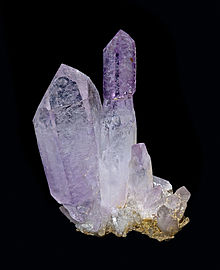amethyst
See also: Amethyst

English
editEtymology
editFrom Middle English ametist, from Old French ametiste (French améthyste), from Ancient Greek ἀμέθυστος (améthustos, “not drunk”), from ἀ- (a-, “not”) + μεθύω (methúō, “I am drunk”), from μέθυ (méthu, “wine”). The Greeks believed that the amethyst prevented intoxication.
Pronunciation
editNoun
editamethyst (plural amethysts)
- A transparent purple to violet variety of quartz with traces of manganese, used as a gemstone.
- 2012 March, Lee A. Groat, “Gemstones”, in American Scientist[1], volume 100, number 2, archived from the original on 14 June 2012, page 128:
- Although there are dozens of different types of gems, among the best known and most important are […] . (Common gem materials not addressed in this article include amber, amethyst, chalcedony, garnet, lazurite, malachite, opals, peridot, rhodonite, spinel, tourmaline, turquoise and zircon.)
- (uncountable) A purple colour.
- amethyst:
- (heraldry) The tincture purpure, when blazoning by precious stones.
- 1726, John Guillim, The Banner Display'd, page 407:
- The Field is Topaz, a Lion rampant Amethyst [...]
- 1834, The Art of Heraldry; Explaining the Origin and Use of Arms and Armorial Bearings, Etc, page 14:
- Purple, on the arms of princes Mercury, of peers amethyst, and of commoners purpure, [is represented] by diagonal lines from the sinister chief to the dexter base.
- 1906 (printed), The Beetham Repository, 1770 (eds. William Hutton, John Rawlinson Ford), page 115:
- 1st & 4th grand Quarter alike viz. Field Pearl, on a bend Sapphire 3 Buckheads, coup'd topaz for Stanley. The 2d Quarter, Field Sapphire with an inverted Chief, amethyst. The 3d, A Checque topaz & Amethyst, this seems prior to Bosworth field, to have belong'd to Sr Robt Goushill whose Dr a Stanley married [...]
Derived terms
editTranslations
editgem
|
colour
|
- The translations below need to be checked and inserted above into the appropriate translation tables. See instructions at Wiktionary:Entry layout § Translations.
Translations to be checked
|
Adjective
editamethyst (comparative more amethyst, superlative most amethyst)
- Having a colour similar to that of the gemstone
Translations
editcolour
|
See also
editFurther reading
edit- David Barthelmy (1997–2024) “Amethyst”, in Webmineral Mineralogy Database.
- “amethyst”, in Mindat.org[2], Hudson Institute of Mineralogy, 2000–2024.
- The Manual of Heraldry, Fifth Edition, by Anonymous, London, 1862, online at [3]
Welsh
editEtymology
editPronunciation
edit- (North Wales) IPA(key): /ˈamɛθɨ̞sd/, [ˈamɛθɨ̞st]
- (South Wales) IPA(key): /ˈamɛθɪsd/, [ˈamɛθɪst]
Noun
editamethyst m (plural amethystau)
Mutation
edit| Welsh mutation | |||
|---|---|---|---|
| radical | soft | nasal | h-prothesis |
| amethyst | unchanged | unchanged | hamethyst |
| Note: Some of these forms may be hypothetical. Not every possible mutated form of every word actually occurs. | |||
Further reading
edit- R. J. Thomas, G. A. Bevan, P. J. Donovan, A. Hawke et al., editors (1950–present), “amethyst”, in Geiriadur Prifysgol Cymru Online (in Welsh), University of Wales Centre for Advanced Welsh & Celtic Studies
Categories:
- English terms inherited from Middle English
- English terms derived from Middle English
- English terms derived from Old French
- English terms derived from Ancient Greek
- English 3-syllable words
- English terms with IPA pronunciation
- English terms with audio pronunciation
- English lemmas
- English nouns
- English countable nouns
- English terms with quotations
- English uncountable nouns
- en:Heraldic tinctures
- English adjectives
- en:Birthstones
- en:Gems
- en:Purples
- Welsh terms borrowed from English
- Welsh terms derived from English
- Welsh terms with IPA pronunciation
- Welsh lemmas
- Welsh nouns
- Welsh countable nouns
- Welsh masculine nouns
- cy:Birthstones
- cy:Gems